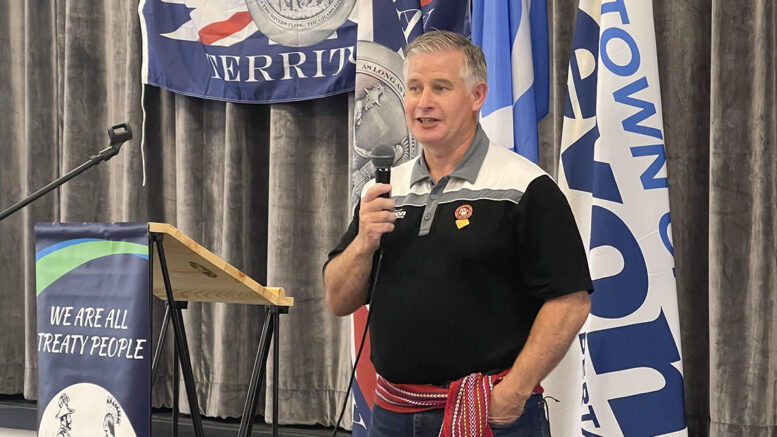By Chevi Rabbit, Local Journalism Initiative Reporter
(ANNews) – During its third annual Treaty 6 Day celebration, the town of Devon reaffirmed its unwavering commitment to Indigenous culture and the pursuit of reconciliation. Mayor Ray Ralph officially declared August 23rd as Treaty Six Day, recognizing the historical significance of Treaty Six and the enduring connection between Indigenous Peoples and Settler-Canadians. In an exclusive interview, ANNews spoke with Mitch Wincentaylo, the Organizer and Town of Devon Indigenous consultant, and Devon Councillor Mike Hanly, both of whom played central roles in this year’s event.
For Mitch Wincentaylo, the day was an opportunity for education, learning, and the celebration of the Treaty relationship, with a strong emphasis on Devon’s role as a treaty partner in this sacred covenant. He also envisions this event evolving into a broader regional partnership, encompassing municipalities, First Nations, and various organizations.
Councillor Mike Hanly took the spotlight during Devon’s Treaty Six Day celebration. His story is a testament to Canada’s rich shared history, deeply rooted in both Métis and Indigenous heritage.
Hanly began by reflecting on the day’s activities. “Today, we delved into land-based education,” he said. “Allow me to share a bit about my personal history as a proud Métis man. Exploring my heritage has been a lifelong aspiration. My father, who shared the same desire to learn and pass on our traditions, embarked on a challenging journey.”
Hanly continued, “Throughout his life, my dad worked tirelessly to impart knowledge whenever he could. He took the initiative to study Cree, ensuring that whenever we encountered Elders, I had the privilege of meeting them and acquiring valuable skills. This was invaluable to me, as it allowed me to uncover the story of how our culture had gradually eroded over time.”
He then shifted the focus to his second great-grandfather, Antoine Lhrondelle, who stood as a courageous figure in their family history. “Antoine was the brave soul who chose to take legal action against the Crown,” Hanly explained. “He implored them to uphold the law and prosecute those committing fraud against the Métis people. While he received permission to go to the Supreme Court, he was thwarted by exorbitant fees and intimidation tactics.”
Hanly delved deeper into the historical context, recounting the challenging circumstances faced by his family and the Métis community in Edmonton. “In the days before World War Two, Edmonton was a place marred by sectarian violence brought by colonialism,” he shared. “Tensions between Anglicans and Catholics ran high, and the French Métis community faced strong prejudice, essentially being pushed out of the city.”
Métis scrip, intended to empower the community, was manipulated, and turned into a fraudulent system, he explained. “People were permitted to exploit and steal the scrip, using it to build up Edmonton’s economy falsely,” Hanly said. “This abuse of power led to the vilification and shame of the Métis people, with influential figures like Frank Oliver consistently demonizing them while profiting from their struggles.”
Hanly reflected on the negative impact of prominent, historical figures like Frank Oliver in Edmonton’s relationship with Indigenous Peoples. Oliver, who held office as a Member of Parliament and Minister of the Interior in the early 20th century, implemented policies such as forced relocations of Indigenous communities and dispossession of their lands, which had lasting detrimental effects on Indigenous Peoples in the region.
Hanly then turned to the present, noting the ongoing efforts to uncover the truth about the past. “The truth is coming to light, particularly regarding individuals like McDougall, Oliver, and Secord, who played a role in the misappropriation of my family’s ancestors’ scrip,” he revealed. “Historical research is strengthening our case, providing vindication for our claims.”
Hanly spoke passionately about his family’s experiences as he shared his own journey. “When I take my kids to Fort Edmonton, I used to explain the history and the significance of the places where individuals like McDougall, Oliver, and Secord operated,” he said. “Sadly, these figures are no longer acknowledged, as they have chosen to ignore the dark history they represent.”
He continued, “Contrary to some assumptions, I’ve never been ashamed of my culture in my daily life. While there were times when I held back, I share the same sentiment as my grandmother, Alice Lhrondelle. I don’t believe she ever felt shame. When she passed away, and the pictures depicting her native heritage were taken down, hidden as best she could, her beadwork remained concealed within a picture frame on the wall, visible only to herself. In her heart, she never abandoned who she was, and I believe fear, not shame, played a role in her actions.”
Hanly concluded with a call to action. “For Métis and all communities, we must strive for truth and reconciliation. This process begins with uncovering and sharing the truth about our history. Once we establish this foundation of honesty, we have a solid platform upon which to build reconciliation.”
He emphasized the shared desire for justice and a better future. “I genuinely believe that everyone who comprehends the reality of our history wants to make things right,” Hanly stated. “They can see how our communities continue to suffer due to the failure to fulfill our treaty obligations. By honouring these commitments, such as the Medicine Chest clause, we can address the challenges faced by communities like downtown Edmonton. Embracing the truth benefits us all.”
In closing, Hanly acknowledged the importance of the promises made in the treaties and the wisdom of the Elders who were part of those agreements. “These treaties, if genuinely honoured, would already be guiding us toward the solutions we need to address the issues we face today,” he concluded.



Be the first to comment on "Devon Councillor Mike Hanly draws from the past and looks to the future"